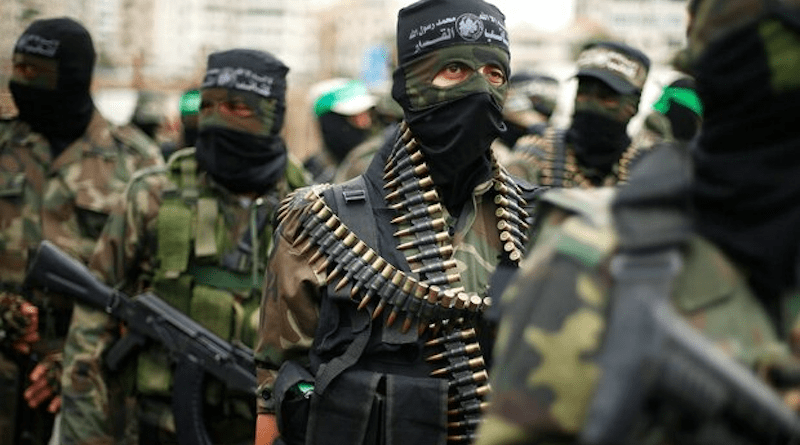Kabir Taneja

As the conflict in Gaza between Israel and Hamas continues without any end in sight, an increasingly visible big-power(s) competition has afforded a few non-state armed militant groups some space that they can take advantage of. The US and its Western allies on one side and Russia and China on the other may be a widening geopolitical crevasse, a point of worry for many. But for the likes of Hamas and the Afghan Taliban, it’s an opportunity.
Post The Post-WWII Global Order
The slow disintegration of the post-World War II global order has given ample space to non-state armed groups to not just rekindle their own political and ideological aims but also get access to more institutional frameworks, such as those of the United Nations, as well as its clubhouse, the Security Council (UNSC). Recent reports in some sections of regional media in West Asia have suggested that a meeting took place in Doha between Ismail Haniyeh, the leader of Hamas’s political bureau, and Cao Xiaolin, China’s ambassador to Qatar. Haniyeh reportedly praised China’s role and stand in the UN on the ongoing war in Gaza and was in favour of the Palestinian cause, while also highlighting Beijing’s humanitarian assistance.
Meanwhile, Russia also recently hosted a congregation of Palestinian groups, which included representation from both Hamas and the Palestinian Islamic Jihad. Russia’s foreign minister, Sergei Lavrov, on the sidelines of this meet reiterated his country’s support for a unified Palestine Liberation Organisation, an effort that would see Hamas try to work with Fatah, a Palestinian movement it has fought against over political and ideological differences. Nonetheless, the question is not so much about Hamas here but Russia’s aim and role, considering this is not the first time Moscow has hosted Palestinian groups since October 2023.
Russia And China Want To Establish New Narratives
As US-led talks fail to deliver a ceasefire in Gaza and civilian deaths rise rapidly, for Russia and China, this is the perfect time to puncture narratives in and around Western—and, more specifically, US-led—global power and security blueprints. Both Beijing and Moscow also have good relations with countries like Iran, a primary patron of Hamas, and Qatar, which hosts the political office of Hamas, offering mediation options. All this is accentuated by a deepening wish of middle-power states to chart their own strategic autonomy and not side with specific geopolitical camps or alliances. This was also seen during the initial stages of the Ukraine war, when long-standing allies of the US in West Asia hesitated to vote against Russia at the UN.
It is not just Hamas that is benefiting from this. The Taliban, now close to three years in power in Afghanistan, is also chiselling away at any prevailing idea that it is an ‘isolated’, hermit state. At a recent graduation ceremony of religious students in Kabul, the Taliban’s Deputy Prime Minister for Political Affairs, Mawlawi Abdul Kabir, highlighted that the Islamic Emirate is in “practical engagement” with the world and not in isolation. This was in parallel to Neda Mohammed Nadim, the acting Minister for Higher Education, saying that Islamic scholars (ulema) have a responsibility to preserve the Islamic system. Both these positions can be seen as pushback by the Taliban against Western—and UN-led—demands on issues such as women’s education and rights. The group sat out the UN conference in Qatar on Afghanistan’s future a few weeks ago.
Taliban-Led Afghanistan No More An ‘Isolated’ State
The Taliban is indeed engaging with most of its regional neighbours, including India. Russia, despite its vocal apprehensions about the group, has pushed ahead with the Moscow format and deals with them on a day-to-day basis. China has gone further, with Xi Jinping personally accepting the credentials of the Taliban’s new ambassador in Beijing in January. China is today Afghanistan’s biggest economic partner and political proponent.
Amid an increasingly divisive narrative of “us versus them (West)”, both Russia and China have reoriented their risk assessments about more volatile geographies and issues. In comparison, the 9/11 was seen by Russia at least as an opportunity to build bridges with the US. In Afghanistan, the Kremlin at that time had shared intelligence and even logistical support against Al Qaeda in the initial stages of the military campaign.
Fluid Friendships
Ultimately, both Russia and China see the exit of the US military from the Eurasian region as a bigger strategic victory for their individual and collective interests despite often having conflicting opinions on the Taliban regime. The same trajectory can be seen in West Asia. Scholar Yun Sun recently said that China’s aim is to displace and not necessarily replace US dominance, and Russia’s interests as well are in tow with Beijing.
In the midst of this kautilyan version of chaos theory, actors that thrived and survived on the peripheries of international relations as security threats may now find themselves being offered the mic, chair, and spotlight.
No comments:
Post a Comment